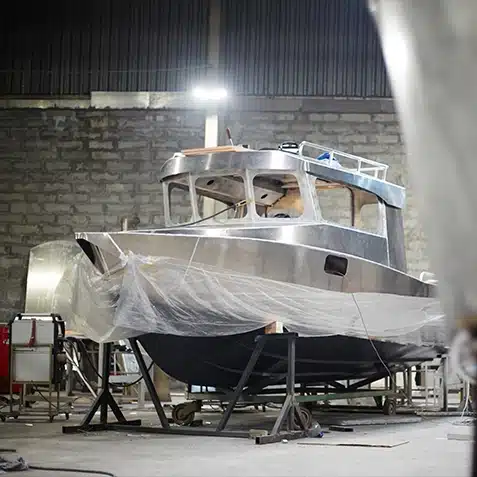Yacht & Boat Building Course
Diploma in Yacht & Boat Building
Yacht & Boat Building
This globally-recognised boatbuilding diploma provides structured training for careers in boatbuilding, yacht fabrication and small craft production.
MTA’s online boat fabricator training covers all modern vessel construction processes – from hull building using GRP and composite materials, through to onboard systems installation and finishing. And is ideally suited to aspiring boatbuilders, marine technicians or workshop supervisors looking to formalise and advance their technical knowledge.

Professional Yacht & Boat Building Qualification
Train for a career in yacht and small craft construction with a course designed to reflect the real workflows of boatyards and production yards.
Contact us below to enrol today, or speak with our experienced course advisors.

Duration:
12 - 18 months
Learn at your own pace
Online Course:
Study from anywhere

Cost:
Diploma: £3,195
Certificate: £2,295

Recognised by: 
Yacht and Boat Building Diploma vs Certification
Choose the right path for your career:
Comprehensive Training: GRP and composite construction, hull structures, marine systems installation, interior fit-out, finishing, workshop practices and safety protocols.
Flexible Study Duration: 12 – 18 month depending when you enrol to the program, study online at your own pace, from anywhere in the world.
Marine Industry Career Opportunities: 100% Online, with access to our student learning portal
Long-Term Career Impact: Boatbuilder, Yacht Joiner, GRP Laminator, Refit Technician, Marine Construction Supervisor, Boatyard Team Leader.
Global Recognition: Our Diplomas are recognised by the University of Portsmouth and are supported by industry associations.
Assignments: One assignment is required to be completed and submitted at the end of each module, based on that particular subject.
Certification: you will receive a PDF Digital certificate (Printed Certificate Completion Pack available).
Final Examination: There will be a final examination upon completing and submitting all student assignments (exams are sat in April or October).
Post-Nominal letters: On passing the Diploma you can also use these letters after your name: MTA Dip YBB
Digital Course Badge: Upon successful completion students will receive an exclusive course badge for use on business cards, LinkedIn profiles and website(s)!
Diploma - £3,195
A formal qualification in professional boatbuilding, suitable for those pursuing technical roles in newbuild construction, refit yards or marine manufacturing.
✔
✔
✔
✔
✔
✔
✔
✔
✔
✔
Certificate - £2,295
For candidates seeking practical knowledge without formal assessment. Ideal for apprentice boatbuilders or those gaining initial exposure to marine fabrication environments.
✔
✔
✔
✔
✔
✔
Yacht and Boatbuilding Curriculum: 10 Modules
The course provides a comprehensive grounding in professional boatbuilding practices used in both production-line and custom yacht construction.
Topics include:
- GRP and wooden hull fabrication
- Lamination and composite materials
- Internal systems layout and fit-out
- Structural alignment and deck joinery
- Finishing, varnishing and inspection standards
- Workshop planning and marine safety procedures
Whether you’re training for the first time or formalising hands-on experience, this course builds technical fluency for roles across the boatbuilding and marine construction industry.
1. Deciding On A Boat To Build
- Assessing your needs and inspirations
- Different classes of a self-build
- Basic Yacht Designs
- Basic Motor Boat designs
- Basic construction types
- The build facility
- Yacht designers
2. Managing The Build Process
- Where to Build
- Workshop/Yard requirements
- Budgeting and Costs
- Project Management
- Sourcing Parts
- Buy or Lease/machinery and tools
- BOM’s/detailed costs
3. Documentation/Training
- CE Certification
- Type Approval/Licensing
- Legal Requirements
- VAT/ Goods Service Tax etc
- Warranties/Manuals
- Learn to Sail
- Basic Safety at Sea
4. Constructing in Steel/Aluminium
- History/Background
- Construction Techniques
- Designers Plans
- Kit Builds
- Health & Safety
- Skills required
- Sub-contracting/ machinery & tools required
- Paints coatings/protective systems
5. Mechanical Systems
- Propulsion
- Stern Gear
- Steering & rudders
- Generators
- Water makers
- Pumping Systems
- Tools required & sub-contracting
- Documentation and conclusion
6. Basics of Yacht/Boat Building
- To loft or not?
- Basics of lofting
- Advanced lofting
- Considerations for motor boats
- Considerations for yachts/sailboats
- Common boat/shipbuilding terms
7. Constructing a Wooden Boat
- History/Background
- Construction techniques
- Designers plans
- Building moulds, jigs & strong-backs
- Wooden kit boats
- Health & safety
- Skills required
- Different types of wood/timber used in boat building
8. Building in GRP
- The evolution of GRP yacht building
- Materials used
- Construction techniques
- Design drawings & weights
- Kit builds & mouldings
- Building plugs & moulds
- Skills, sub contractors & tools
- Building the Hull & Deck
- Sub mouldings and bulkheads
- Health & Safety with GRP work
9. Fitting Out
- Internal Layouts
- Electrical Systems
- Water & Sanitation Systems
- Safety Equipment & Navigation Systems
- Anchoring, mooring & Deck fittings
- Painting your yacht
- Health & Safety, tools & equipment
- Skills required & sub-contracting
10. Finishing The Vessel
- Boat relocation
- Launching
- Ways of lifting & launching a vessel
- The actual launch
- Stepping the mast
- Types of berth/moorings
- Sea Trials
- Modifications
- Insurance
Hear from our Students
Meet the Course Director
Andrew Pitt
MRINA
Andy J.J. Pitt is a naval architect, boatbuilder, shipyard manager and technical author with fifty years’ experience in the marine industry. He owned and operated a boatyard in Denmark and since managed and consulted on marine projects in: England, Denmark, Malaysia, Thailand, Vietnam, Bangladesh, Austria, China, Scotland, Germany, Spain, Greece, Sweden, Gibraltar, USA & Singapore.
He has published twenty books on naval architecture, yacht & boat building, project management, superyacht building, boatyard management, marine surveying, marine engineering and restoring historic vessels. He teaches the above subjects and works with maritime museums around the world checking design drawings and writing historic notes. He is a member of the ‘Yachting Journalists Association’ and Fellow at the ‘Royal Institute of Naval Architects’.

Yacht & Boat Building Course FAQs
Find out more about the course with our FAQs below.
How do I become a boatbuilder?
Start by enrolling in a recognised training programme. This diploma gives you the core construction knowledge needed to work in commercial boatyards, production teams or specialist refit environments.
How much do boatbuilders earn?
Wages range from £25,000 to £45,000 depending on role and experience. Skilled laminators, yacht technicians and supervisors at major yards may earn more.
What qualification will I receive?
You’ll gain an internationally recognised Diploma in Yacht and Boat Building from the Maritime Training Academy recognised across the marine construction sector.
Does this course cover GRP and fiberglass boatbuilding?
Absolutely, GRP, composite layup and resin systems are a key part of the course, along with structural and finishing techniques.
Can I take this course without experience?
This course is suitable for everyone, from complete beginners, to apprentices and current yard staff looking to expand their technical knowledge.
Can I complete this boatbuilding course online?
Yes, the course is delivered fully online with tutor support, so you can study flexibly alongside work or other commitments from anywhere in the world.
See our FAQ page for more questions answered about MTA courses.
Supported by:


Why Choose The Maritime Training Academy?

Flexible
Online learning allows you to study in your own time, at your own pace from anywhere in the world. This saves on travel and classroom costs and allows you to fit your studies around your job and progress your career.

Supportive
While the nature of distance learning is independent study, we recognise the importance of support. Students can contact us at any time during their course for assistance and our team of industry experts are always on hand for advice.

Expertise
We have over 50 industry experts writing, developing and advising on our course material. We truly believe that allowing students to tap into their expertise and knowledge is of the utmost importance to fulfil your dream career.
If you would prefer to complete this as a classroom-based course, please contact us.
